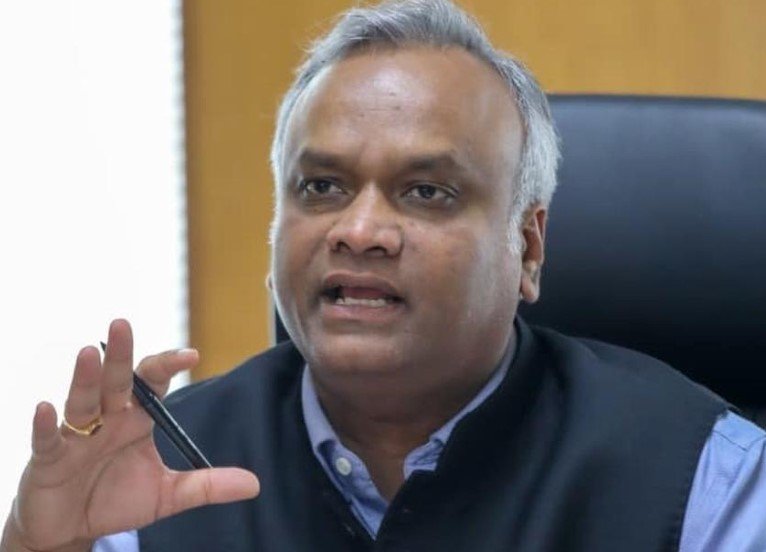Karnataka’s IT Minister Priyank Kharge has labeled Andhra Pradesh’s incentive package for Google’s massive AI hub as an economic disaster. The criticism came after Google announced a $15 billion investment in Visakhapatnam on October 15, 2025, sparking a heated debate between the two states over tech investments and subsidies.
This move highlights growing rivalries among Indian states to attract global tech giants. Kharge pointed out that such heavy subsidies could strain Andhra’s finances, while Karnataka leaders blame their own government for missing out on the deal.
Google’s Big Bet on Andhra Pradesh
Google plans to build its largest AI data center in India at Visakhapatnam, with an investment exceeding $15 billion. The project aims to create a gigawatt-scale AI infrastructure hub, boosting local jobs and tech innovation.
Andhra Pradesh Chief Minister N Chandrababu Naidu hailed the deal as a game-changer, joking that the “G” in Vizag now stands for Google. The state government sealed the agreement with Raiden Infotech, a Google entity, promising major perks to lure the tech giant.
Key incentives offered by Andhra include:
- Subsidized land at 25 percent below market rates
- Power supply at just Rs 1 per unit
- Full reimbursement on certain costs
- Free water and electricity for operations
These benefits total around Rs 22,000 crore, designed to make the state attractive for high-tech ventures. Officials say the hub could generate thousands of jobs and position Andhra as a key player in India’s AI landscape.

The announcement follows Google’s global push into AI, with similar investments in other countries. In India, this marks the company’s biggest commitment yet, aligning with the nation’s digital economy goals.
Priyank Kharge’s Sharp Critique
Priyank Kharge, Karnataka’s IT and Biotechnology Minister, did not hold back in his response. He called the incentive package unsustainable and questioned how any state could afford such giveaways without long-term harm.
Kharge clarified that Google never discussed the project with Karnataka officials. He argued that offering free resources and massive subsidies sets a dangerous precedent for economic competition among states.
In a recent interview, Kharge stated that these deals resemble “political scavenging” rather than sound policy. He warned that they could lead to fiscal imbalances, especially if states chase short-term wins over balanced growth.
This is not the first clash between Kharge and Andhra leaders. Earlier spats over startup poaching have fueled tensions, with Kharge accusing rivals of desperate tactics to draw businesses from Bengaluru.
Political Backlash in Karnataka
Opposition parties in Karnataka quickly seized on the news to attack the ruling Congress government. The Janata Dal (Secular) described it as a “major blow” to Bengaluru, India’s tech capital.
JDS leaders blamed poor infrastructure and policy failures for losing the investment. They claimed Congress’s focus on welfare schemes has weakened the state’s ability to compete for big projects.
Even BJP figures joined the criticism, pointing to Karnataka’s fragile economy under current leadership. One leader mocked Kharge’s comments, suggesting his party’s own shortcomings drove Google away.
Public sentiment on social media reflects frustration. Many users lamented Bengaluru’s traffic and power issues, which may have deterred investors.
| Aspect | Andhra Pradesh Offer | Potential Karnataka Impact |
|---|---|---|
| Investment Size | $15 billion | Loss of jobs and revenue |
| Subsidies | Rs 22,000 crore in perks | Pressure to match in future deals |
| Job Creation | Thousands in AI and tech | Missed opportunities for youth |
| Timeline | Construction starts soon | Delays in competing projects |
This table shows how the deal affects both states. Karnataka now faces calls to revamp its incentive strategies.
Economic Implications for States
Experts warn that aggressive subsidies could spark a race to the bottom among Indian states. While they attract immediate investments, they might burden public finances over time.
Andhra’s package includes low-cost power and land, which could save Google billions. However, critics like Kharge argue this diverts funds from essential services like education and healthcare.
Nationally, India’s tech sector is booming, with AI investments projected to reach $20 billion by 2027. States like Tamil Nadu and Gujarat have also offered big incentives, intensifying competition.
Karnataka, home to over 30 percent of India’s startups, risks losing ground if it does not adapt. Recent events, such as semiconductor firms choosing other states, add to the pressure.
On the positive side, such rivalries could drive overall improvements in infrastructure and policies across India.
What Lies Ahead for Tech Investments
Looking forward, Google’s hub in Andhra may inspire more global firms to eye India’s southern states. Andhra aims to become an AI powerhouse, with plans for skill development programs tied to the project.
For Karnataka, the loss underscores the need for better roads, reliable power, and competitive policies. Leaders are already discussing reforms to regain investor confidence.
As debates continue, the focus shifts to sustainable growth. States must balance incentives with fiscal health to avoid economic pitfalls.
What do you think about this interstate rivalry? Share your views in the comments and spread the word to keep the conversation going.
